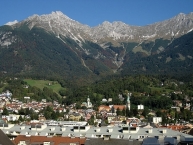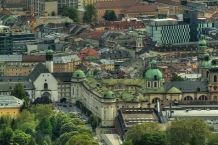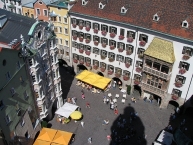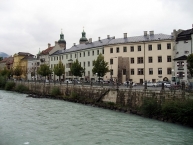Inn Cycle Route Lower Tyrol and Bavaria
No. of cycle route R2
Actions
![]()
Please wait - map data are loading
Added on 04 May 2013,
last edited by biroto-Redaktion on 30 Nov 2020
Actions
Cycle route metrics
Total distance in km
318
Information about rights to the gps-track data | |
|---|---|
Rights owner | OpenStreetMap and Contributors + biroto-Redaktion (biroto.eu) |
Rights characteristic / license | Contains information from OpenStreetMap, which is made available here under the Open Database License(ODbL) |
Link to the description of the license | |
GPX file taken from | |
GPX file uploaded | by biroto-Redaktion on 30 Nov 2020
|
Track points in total
4.886
Track points per km (avg)
15
Start/endpoint
Start location
Innsbruck, Tirol, AT (578 m NHN)
End location
Passau, Bayern, DE (301 m NHN)
Signposting
Tirol: |
|
Bayern: |
Beds4Cyclists, worth visiting and infrastructure
Name and address
Latitude / Longitude
Phone
Fax
Mobile
Type of accommodation
Rating for cyclists
Route km
Dist. to route
Elevation
0 km
0,6 km
586 m
0 km
0,2 km
588 m
0 km
0,2 km
583 m
Hours of opening
every day 9.00 am - 6.00 pm
24 December: 9.00 am - 12.00 noon
31 December: 9.00 am - 3.00 pm
Languages spoken:
Deutsch ▪ English
0 km
4,4 km
877 m
0 km
0,1 km
585 m
Information about copyright | |
|---|---|
Rights owner | Mathias Bigge |
Rights characteristic / license | by-sa: CREATIVE COMMONS Attribution-ShareAlike |
Link to the description of the license | |
Image taken over from | |
Image has been uploaded | by Ottocolor on 30 Dec 2013
|
Information about copyright | |
|---|---|
Rights owner | MichaelMoessmer |
Rights characteristic / license | by-sa: CREATIVE COMMONS Attribution-ShareAlike |
Link to the description of the license | |
Image taken over from | commons.wikimedia.org/wiki/File:Innsbruck_oefotos_22AT4339.jpg |
Image has been uploaded | by Ottocolor on 30 Dec 2013
|
Information about copyright | |
|---|---|
Rights owner | Pahu |
Rights characteristic / license | by-sa: CREATIVE COMMONS Attribution-ShareAlike |
Link to the description of the license | |
Image taken over from | |
Image has been uploaded | by Ottocolor on 30 Dec 2013
|
Information about copyright | |
|---|---|
Rights owner | Mathias Bigge |
Rights characteristic / license | by-sa: CREATIVE COMMONS Attribution-ShareAlike |
Link to the description of the license | |
Image taken over from | |
Image has been uploaded | by Ottocolor on 30 Dec 2013
|
Innsbruck is the fifth-largest city in Austria and the provincial capital of Tyrol, as well as one of the largest cities in the Alps. Located in a valley of the river Inn between mountain ranges of above 2000 m above sea level, halfway between Bavaria and northern Italy, it is a hub of a region popular for skiing and other mountain-related activities and a busy tourist destination. Its popularity as a winter sports resort was underscored by its hosting the Winter Olympic Games twice.
Understand
The first mention of Innsbruck dates back to the reign of Augustus, when the Romans established the army station Veldidena (the name survives in today's urban district Wilten) at the locality named Oeni Pontum or Oeni Pons, which is Latin for bridge (pons) over the Inn (Oenus), the important crossing point over the Inn river, to protect Via Claudia Augusta, the economically important commercial road from Verona-Brenner-Augsburg.
Innsbruck became the capital of Tyrol in 1429 and in the 15th century the city became a centre of European politics and culture as emperor Maximilian I moved the imperial court to Innsbruck in the 1490s. Many old buildings from the Middle Ages and modern times survived in the heart of old town.
The city is well known for its sporting opportunities, especially alpine sports, as it is in the Alps and surrounded by mountains. Several ski resorts are situated inside the city territory or within short distance. Innsbruck was one of the centers of snowboard boom in the 1990s and the derived distinct subculture endured until today. The population of skateboarders, snowboarders and people alike is therefore above average and nothing unusual to the people. This culture is also celebrated by a lot of events in and around Innsbruck especially in the winter season, attracting (predominantly young) people from all around the world.
There are two universities and several colleges in Innsbruck, with over 25,000 students altogether, (including a significant Italian population) making the city's nightlife very lively.
See
The Innsbruck-Card offers free entrance to all of Innsbruck's sights, free use of public transportation (including the TS line). It also includes a one-time ascent&descent to Nordkette, Patscherkofel and Axamer Lizum and free entrance to Swarovski Kristallwelten in Wattens. The Innsbruck-Card is valid for 24/48/72 hours and can be purchased at Innsbruck Information (Burggraben 3), the TI in Hauptbahnhof, and several museums and tourist offices. Tip: The latest Innsbruck card fare can be found here (2017: €39/€48/€55 for 1/2/3 day cards). And daily or weekly public transport cards are cheap - the "all inclusive" sales pitch is alluring to disoriented travelers, but make sure the discounts are worth the initial price. If you are not seeing these major entrance-fee sites, remember that you may buy more than one daily card at a time, as the 24 hours only starts once validated. Be sure to compare with the price of a weekly ticket too.
The bus line Sightseer (TS) connects the major sights in Innsbruck. However, there is always a cheaper public transport line going to the same destination, though it might take you more time.
Churches and Cathedrals
- ⊙Hofkirche, Universitätsstraße 2. Innsbruck's Hofkirche has the most important emperor's tomb monument (of emperor Maximilian I) in Europe. Especially characteristic are the larger-than-life bronzes ("schwarze Mander") that show members of different dynasties. Entrance: €3, reduced: €1.50, free with the Innsbruck-Card.
- ⊙Cathedral at Saint Jacob (Dom zu St. Jakob), Domplatz. Baroque styled cathedral, with works of Lucas Cranach the Elder. From 1717-1724 it was rebuilt (after damage from an earthquake) according to the plans of Johann Jakob Herkomer and Johann Georg Fischer. Free entrance.
- ⊙Wiltener Basilika, Haymongasse/Pastorstraße. Baroque styled church with Rokkoko-stucco, built from 1751-1756. Free entrance.
- ⊙Stift Wilten, Klostergasse. Premonstratensian monastery with a baroque collegiate church, not far from Wiltener Basilika. Free entrance.
Castles and Palaces
- ⊙Schloss Ambras, Schloßstraße 20 (Tramlines 6 (nearest stop) and 3, Bus: C (Stop: Luigenstraße)), ☎ +43 1 52524480 2. Open 10AM - 5PM. A renaissance style castle that was built on behalf of archduke Ferdinand II of Tyrol. Interesting things to see are portrait- and armor-collections, art and curiosity cabinets, the Spanish hall and the palace garden. April to October: €8. December to March: €4.50.
Buildings
- ⊙Bergiselschanze (ski jump by Zaha Hadid), Bergiselweg 3 (frp, the train station, walk 30 minutes to South. Or take the tram lines 1 (to Bergisel), 6, STB (to Stubaitalbahnhof or Sonnenburgerhof) or the bus line TS (to Tirol Panorama)). The Bergisel jump was replaced according to plans of the Iraqi architect Zaha Hadid in 2001. Because of its design and prominent location (on Bergisel, south of Innsbruck) it is considered a new city landmark. There is a cafe on top, which offers views of Innsbruck and the surrounding mountains. During sporting events, the jumping tower is not accessible, and a ticket is needed to enter the terrain.
Memorials
- ⊙Goldenes Dachl (Golden Roof), Herzog-Friedrich-Straße. Late-gothic alcove balcony, with 2657 fire-gilded cupreous shingles. It was built on behalf of emperor Maximilian I.
- ⊙Annasäule (St. Anna Column), Maria-Theresien-Straße. The column, which is made of Tyrolean marble, was created in 1706, in memory of the drawback of Bavarian troops.
- ⊙Triumphpforte (Triumphal Arch), Maria-Theresien-Straße (Southen end of Maria-Theresien-Straße). It was built in 1765 to mark the marriage of archduke Leopold and the Spanish princess Maria Ludovica. The north side displays mourning themes on the occasion of Franz Stephan of Lothringen.
Museums
A combined ticket for the Tyrolean State Museums is available for €10, or €6 discount, and offers entry to The Ferdinand, Hofkirche, Volkskunst, Zeughaus and Das Tiroler Panorama Museums until the end of the calendar year. The ticket includes a free audio guide (which is worth getting as information is otherwise only in German) at some locations.
- Alpinist Association Museum, Wilhelm-Greil-Straße, ☎ +43 512 58718612. 9AM-5PM. €1.10.5.50; free with Innsbruck Card.
- ⊙Anatomical Museum, Müllerstraße 59, ☎ +43 512 90037111 1. Fridays only, 2-4PM (and on reservation), Oct-May. June through September it is only open on advance notification. Objects from human preparations, to history of development and old anatomical devices.
- ⊙Bell Museum, Graßmayr, Leopoldstraße (tram lines 1, 3 and TS). The Bell foundry has existed for 400 years, and been lead by the same family for 14 generations.
- ⊙Hofburg, Rennweg. 9AM - 5PM daily. It was modified to rokoko-style by order of the empress Maria Theresia.
- ⊙Tirol Panorama, Bergisel 1 (S-Bahn 1 to the Bergisel stop). Incorporating the Kaiserjägermuseum (Imperial Hunting Museum)
- Maximilianeum Goldenes Dachl, Herzog-Friedrich-Straße. Information on the impressive life of emperor Maximilian I.
- Riesenrundgemälde [5], Rennweg (bus lines 4, O, E). A Panorama painting of the Battle of Bergisel, August 13, 1809, over 1000 square meters in size. One of the world's last 24 panoramas.
- ⊙Stadtturm Innsbruck (City Tower). Herzog-Friedrich-Straße.
- ⊙Tiroler Landesmuseum. Ferdinandeum, Museumstraße, Scientific collection, Feldstraße and Museum im Zeughaus, Zeughausgasse
- Tiroler Volkskunstmuseum (Folk Art Museum), Universitätsstraße 2, ☎ +43 512 59489510. Opened after reconstruction in 2009.
Boulevards and Squares
- ⊙Maria-Theresien-Straße. Innsbruck's Boulevard and central pedestrian area. St. Anna's Column and the prominent Nordkette mountain range make popular backgrounds for holiday photos.
- ⊙Herzog-Friedrich-Straße. The Old Town's "main street" (now a pedestrian area). It expands to a square in front of the Golden Roof.
- ⊙Sparkassenplatz. and BTV Forum. Innsbrucks modern urban center, accessible from Maria-Theresien-Straße and close to the Old Town. Has a range of cafés and restaurants, as well as shops. Farmers' market on Fridays and free concerts, film screenings and concerts in summer.
Parks
- ⊙Botanischer Garten (Botanical Garden), Sternwartesstraße 15 (Bus A will take you just outside of the main entrance), ☎ +43 512 5075910. Open daily from 7:30AM until 7PM. In the winter, the garden is open until 4:30PM. Adults: €2, Children, students, and seniors: €1.
- ⊙Hofgarten (Imperial Court Park), Two minutes away from the Old Town (Entrances at Rennweg and Kaiserjägerstraße).
Eat
- ⊙Gasthaus Anich, Anichstraße 15 (city center, close to Maria-Theresien Strasse), ☎ +43 512 570450. M-Sa 9:00 - 24:00, closed on Sundays. This is a real "Gasthaus" (tavern) with Austrian cuisine. Not too crowded and mostly visited by locals, it's an insider tip. Great portions. Offers separate smoking and non-smoking areas.
Information about copyright | |
|---|---|
Rights characteristic / license | by-sa: CREATIVE COMMONS Attribution-ShareAlike |
Link to the description of the license | |
Input taken over from: |
Wikivoyage contributors, 'Innsbruck', Wikivoyage, The FREE worldwide travel guide that anyone can edit, 25 January 2017, 12:58 UTC, https://en.wikivoyage.org/w/index.php?title=Innsbruck&oldid=3132341 |
taken over / edited on | 30 Dec 2013 - 09 Apr 2022
|
taken over / edited by |
|
![]()





